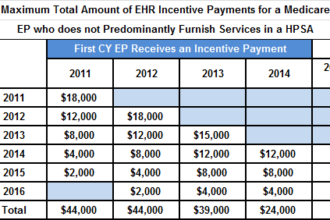The CMS-required ICD-9 to ICD-10 migration requirement is creeping upon us and I’ve been getting lots of questions from readers about what steps technology vendors and healthcare providers should be taking in getting ready for the undertaking. To help get some actionable advice I reached out to Steve Dion, a senior marketing manager for GE Healthcare, and Kim Lorusso a product marketing manager for GE Healthcare. They have been successful in helping many customers make progress on their ICD-10 migration by using GE’s Centricity Business solution for ICD-10; it is something worth checking out and you can follow them on Twitter at @GEHealthcareIT. If you’ve got questions for Steve and Kim, you can also follow or private message them at @sdion and @kimlorusso. Here’s what Steve and Kim had to say about how to make real progress on your ICD-10 compliance projects:
If you are in the healthcare provider industry and haven’t started preparing for ICD-10, you should be very concerned. ICD-10 compliance, beginning for ambulatory services and inpatient discharges on or after October 1, 2013, is often compared to Y2K and many believe it will be far more disruptive to the healthcare IT environment than Y2K. When we speak to most healthcare organizations about ICD-10 readiness, they start to turn ghost white or reach for the nearest bottle of antacids. This reaction is validation of the monumental task they have ahead. Some of the largest healthcare systems have already begun projects around this big initiative. Project teams have formed to start planning and executing ICD-10 readiness, but they have recognized that an ICD-10 compliant revenue cycle management system is only one piece of the puzzle.
Now, we know we scared you a little bit earlier – you may be thinking that if you haven’t started your ICD-10 readiness efforts, you are too late – not true. You are in good company and are not alone, with most organizations barely starting their vendor readiness plans and the early stages of project planning. That being said, if you are a leader in a hospital’s revenue cycle management organization and haven’t started ICD-10 readiness efforts, you need to instill a sense of urgency TODAY at your organization. The conversion over to ICD-10 will impact not only coding, but all areas of care delivery, into the revenue cycle and beyond. The areas that will be most impacted include: pre-registration/insurance eligibility, clinical documentation, charge capture, coding, billing and collections. To be successful, extensive planning, coordination and communication for both internal and external parties are core requirements.
To comply or not to comply on ICD-10 is not the question. Failure to comply with ICD-10 will severely impact the revenue cycle as reimbursement will cease for all Medicare payments as a result of not sending claims with valid, supported ICD-10 codes and related documentation.
CMS has provided guidance on how to structure your project. They recommend four phases with the first phase of “Assessment and Planning” completed by the end of June 2011. If you haven’t completed your assessment and planning process, then we’ll share with you how to get started on assessing your ICD-10 challenge:
Tips to begin your ICD-10 readiness journey:
- Awareness and Education
- Educate your organization on the regulatory requirements. A few of our favorite resources including CMS’s website: http://www.cms.gov/ICD10/ and 3M’s ICD-10 site: http://www.icd10watch.com/.
- Determine how ICD-10 fits in with other priority initiatives.
- Determine how ongoing communication is going to occur to keep your organization up to date.
- Project Development
- Establish a formal Steering Committee and Project Team to include representation from all areas affected (see above).
- Begin preliminary budgeting for implementation costs, which may include software or hardware upgrades, training, new encounter and claim forms, resources and materials.
- Create a detailed project plan that has all software installed, tested and ready for training staff a minimum of six months in advance of the compliance date.
- Organizational Impact Assessment
- Identify all affected business areas and impacted workflows.
- Determine which workflows currently utilize ICD-9 coding.
- Evaluate reporting needs for both pre and post ICD-10 implementation.
- System Impact
- Develop and analyze an inventory of all applications, interfaces and databases with ICD-9 codes.
- Document any system requirement changes.
- Determine if there are any modifications to software needed and identify costs associated with those changes.
- Vendor Readiness
- Don’t wait for your vendors to start the communication process for ICD-10 readiness – initiate these discussions immediately. Some vendors, like GE Healthcare, have announced support plans across their customer base with dates for support files and FAQ documents as well.
- Quality of Medical Records Documentation
- Engage the clinical information services team to learn what steps they are taking to ensure documented support for the new ICD-10 codes.
- Contract Language
- Begin discussions with your various payer organizations to learn their plans for ICD-10 readiness.
- Start the conversation of reimbursement rates under ICD-10.
- Plan to have all contracts re-negotiated in advance of the compliance date so that there are no surprises from a reimbursement standpoint.
- Training
- Determine who will need to be trained and to what level.
- Determine how and when training will occur.
- Identify Education Planning Resources.
- Determine any budgeting costs associated with training, curriculum development or outside resources required.
So, even if you follow all these steps outlined above, there are risks and concerns around ICD-10. Even if your organization is ready, some of your payers may not be prepared to accept ICD-10 as of the compliance date. Additionally, in certain cases when required, not all ICD-10 codes are going to be easily translated to ICD-9. Some vendors such as GE Healthcare have provided a crosswalk to assist customers with tackling these challenges, allowing the user to crosswalk ICD-10 codes back to ICD-9 codes if a payer is not ready to accept ICD-10 codes on their claims. There are nuances in the way that any crosswalk feature operates, so careful attention to specifics is warranted early in the project plan.
CMS has issued clear guidelines around the use of the CMS GEMS and Reimbursement files for reimbursement of Medicare claims. The good news is that 95 percent of the codes match backwards from one or many ICD-10 codes to a single ICD-9 code, and some systems will do that match automatically (without user intervention) for any payer that is marked “not-ready” to receive ICD-10 codes. Then there is the five percent of codes which match “many to one” – meaning that one ICD-10 code has multiple ICD-9 codes that could match, in which case the system generates a workflow for a user to make the appropriate choice based on organizational guidelines. There are a small number of ICD-10 codes (<100) that have no valid ICD-9 code today. For those codes which an organization may decide to start using, an alternative plan for submitting claims for services rendered will need to be implemented while certain payers are ramping up their ICD-10 capability.
Some applications allow for custom cross-walking choices to be made in advance (payer specific) as part of the set-up process during upgrade. All of this cross-walking discussion suggests that you plan for how to handle coding for payers who are not capable or ready to receive ICD-10 codes as of the cutover date.
ICD-10 readiness is predicted by many to be a long, arduous journey. We hope this blog post has motivated you to get involved in your organization’s ICD-10 readiness planning process. We’ll leave you with this quote, “He who fails to plan, plans to fail…” –Winston Churchill






